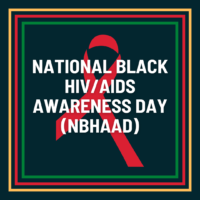Recognizing National Black HIV/AIDS Awareness Day (NBHAAD)
This post was written by our National Health Corps Member, Stutee Acharya. Please read more about her and the work she contributes to in LCHJ’s ALC project, here.
Since 1999, National Black HIV/AIDS Awareness Day (NBHAAD) has been observed every year on February 7th. This day was formed as a way to acknowledge the ways in which HIV disproportionately affects Black people, increase awareness about HIV treatment among Black communities, highlight the inspirational stories of survivors, and celebrate the decreasing rate of infection within Black communities.
It is important to recognize the social and structural inequities that continue to affect HIV prevention and treatment. According to the Centers for Disease Control and Prevention (CDC), Black Americans carry a disparate burden of HIV and AIDS. In 2019, they accounted for 42% of all new HIV diagnoses in the United States, even though African Americans only made up 13% of the U.S. population. Young Black men who are gay or bisexual account for more new infections than any other group, while Black heterosexual women are also more affected by HIV/AIDS than women in other racial or ethnic groups.
There are a number of factors that could attribute to this disparity, including: justifiable apprehensions with healthcare systems due to structural racism; transportation & housing barriers; higher rates of poverty; smaller sexual networks; and stigma surrounding the disease. It is important to note that these factors are interconnected and can exacerbate each other, and for this reason, it is crucial to continue addressing these underlying issues to help reduce the disproportionate impact of HIV/AIDS on Black Americans.
In the face of these obstacles, recent data shows that new diagnoses among Black people overall are beginning to decline – especially among Black women – and are leveling off among gay and bisexual Black men. These positive changes are largely due to the tenacious efforts of promoting HIV testing, prevention, and treatment in Black communities.
National Black HIV/AIDS Awareness Day is a vital opportunity for communities to come together to increase knowledge about the impact of HIV/AIDS on Black populations, continuing to encourage testing and treatment, and promote a message of hope and support for those affected by the disease.
Prevention and Treatment Options
One of the most important methods of mitigating HIV-related risk is regular testing for HIV, especially for individuals at higher risk of exposure to the virus. The individuals that have historically been at greater risk include gay or bisexual males of all ethnic and racial groups, Black women, transgender people, those having unprotected sex with multiple partners, people who engage in intravenous drug use, and individuals who have had sex with an HIV-positive individual who is not already receiving antiretroviral therapy.
Another preventative option is taking Pre-Exposure Prophylaxis (PrEP). PrEP is a medication that HIV-negative individuals and those who are vulnerable to HIV exposure can take to reduce their risk of contracting HIV from sex. It is also recommended for people who share needles or other injection equipment. According to the CDC, PrEP is 99% effective at reducing the risk of getting HIV from sex when used as prescribed and used in conjunction with other preventative measures, such as using condoms and getting regular HIV testing.
A list of PrEP clinics and providers in Chicago can be found, here. Alternatively, please consider contacting Legal Council’s medical partners: Christian Community Health Center (CCHC), PH: 773-233-4100 (Ext: 2122) or Text: 872-256-2678, & Howard Brown Health, PH: 773-388-1600 or prep@howardbrown.org, for additional information on PrEP.
Additionally, if you or a loved one are diagnosed with HIV, it can be life-saving to receive early treatment of antiretroviral therapy, as it has been proven to delay the onset of AIDS. It also improves health outcomes of people with HIV by lowering the amount of virus in the blood to undetectable levels and preventing the risk of transmission to others.
If you need help accessing HIV medication in Chicago, please click here or call the HIV Resource Hub at 1-844-4040.
By working together to promote awareness and break down stigma, we can help to control the spread of HIV and improve the lives of those affected!
This year on National Black HIV/AIDS Awareness Day, let us do our part in continuing the initiative to reduce HIV infection in Black communities in Chicago and across the nation.
Ways to Participate in NBHAAD
- Get tested for HIV
- Attend an HIV Prevention Workshop
- Erie Family Health Services are hosting an event on 02/22 at 3-4 PM
- FREE FOOD, DRINKS, GAMES & GIFT BASKETS!
- Click here for their event flyer and Zoom login info
- Learn More about NBHAAD in a webinar
- NBHAAD.org, in collaboration with My Brother’s Keeper, are raising HIV awareness and fueling discussion by hosting a webinar today at 2 PM (CST)
- Donate to Legal Council for Health Justice
- Our legal aid organization has been providing free services to those most vulnerable to HIV for over 30 years. Donate here!

